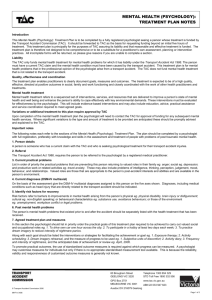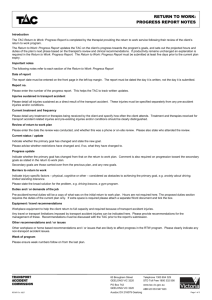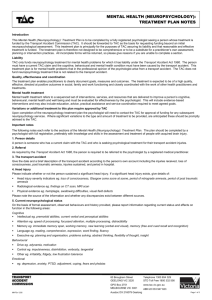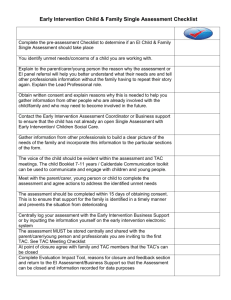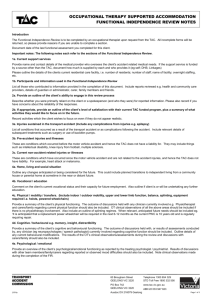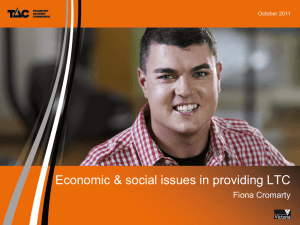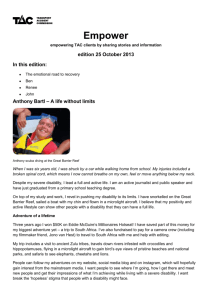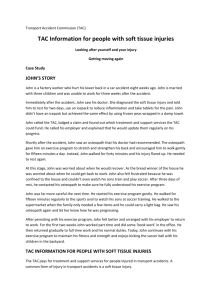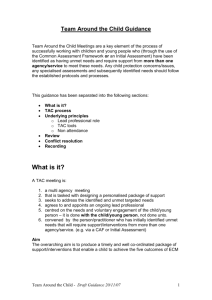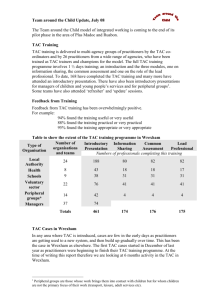Important notes for completing the treatment notification plan
advertisement
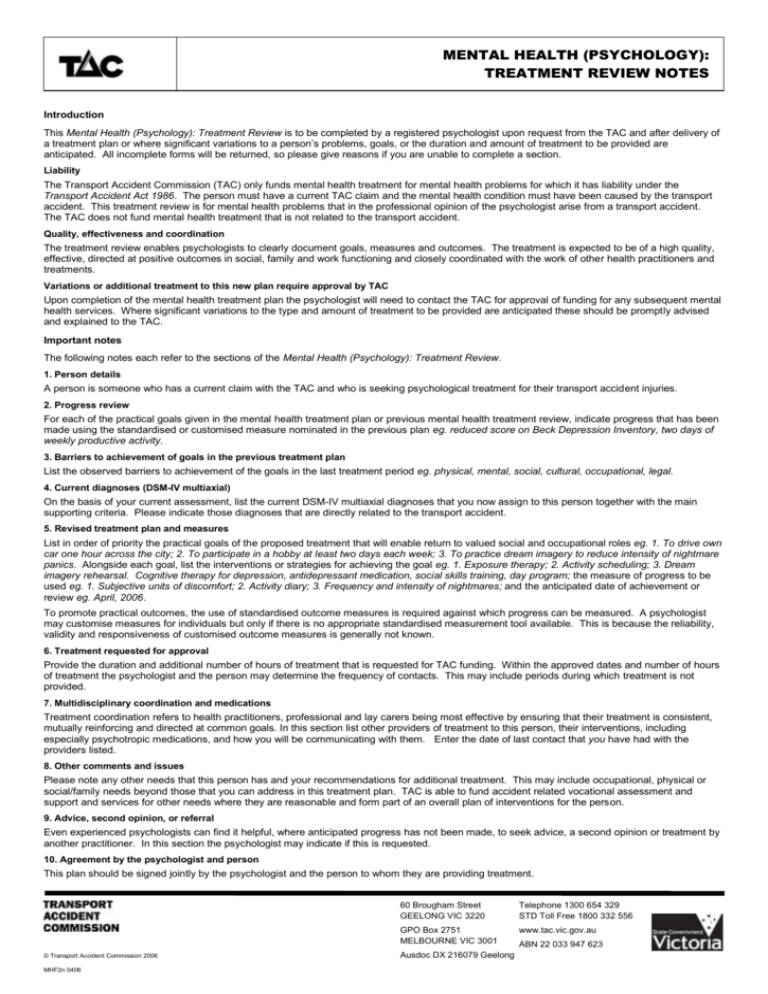
MENTAL HEALTH (PSYCHOLOGY): TREATMENT REVIEW NOTES Introduction This Mental Health (Psychology): Treatment Review is to be completed by a registered psychologist upon request from the TAC and after delivery of a treatment plan or where significant variations to a person’s problems, goals, or the duration and amount of treatment to be provided are anticipated. All incomplete forms will be returned, so please give reasons if you are unable to complete a section. Liability The Transport Accident Commission (TAC) only funds mental health treatment for mental health problems for which it has liability under the Transport Accident Act 1986. The person must have a current TAC claim and the mental health condition must have been caused by the transport accident. This treatment review is for mental health problems that in the professional opinion of the psychologist arise from a transport accident. The TAC does not fund mental health treatment that is not related to the transport accident. Quality, effectiveness and coordination The treatment review enables psychologists to clearly document goals, measures and outcomes. The treatment is expected to be of a high quality, effective, directed at positive outcomes in social, family and work functioning and closely coordinated with the work of other health practitioners and treatments. Variations or additional treatment to this new plan require approval by TAC Upon completion of the mental health treatment plan the psychologist will need to contact the TAC for approval of funding for any subsequent mental health services. Where significant variations to the type and amount of treatment to be provided are anticipated these should be promptly advised and explained to the TAC. Important notes The following notes each refer to the sections of the Mental Health (Psychology): Treatment Review. 1. Person details A person is someone who has a current claim with the TAC and who is seeking psychological treatment for their transport accident injuries. 2. Progress review For each of the practical goals given in the mental health treatment plan or previous mental health treatment review, indicate progress that has been made using the standardised or customised measure nominated in the previous plan eg. reduced score on Beck Depression Inventory, two days of weekly productive activity. 3. Barriers to achievement of goals in the previous treatment plan List the observed barriers to achievement of the goals in the last treatment period eg. physical, mental, social, cultural, occupational, legal. 4. Current diagnoses (DSM-IV multiaxial) On the basis of your current assessment, list the current DSM-IV multiaxial diagnoses that you now assign to this person together with the main supporting criteria. Please indicate those diagnoses that are directly related to the transport accident. 5. Revised treatment plan and measures List in order of priority the practical goals of the proposed treatment that will enable return to valued social and occupational roles eg. 1. To drive own car one hour across the city; 2. To participate in a hobby at least two days each week; 3. To practice dream imagery to reduce intensity of nightmare panics. Alongside each goal, list the interventions or strategies for achieving the goal eg. 1. Exposure therapy; 2. Activity scheduling; 3. Dream imagery rehearsal. Cognitive therapy for depression, antidepressant medication, social skills training, day program; the measure of progress to be used eg. 1. Subjective units of discomfort; 2. Activity diary; 3. Frequency and intensity of nightmares; and the anticipated date of achievement or review eg. April, 2006. To promote practical outcomes, the use of standardised outcome measures is required against which progress can be measured. A psychologist may customise measures for individuals but only if there is no appropriate standardised measurement tool available. This is because the reliability, validity and responsiveness of customised outcome measures is generally not known. 6. Treatment requested for approval Provide the duration and additional number of hours of treatment that is requested for TAC funding. Within the approved dates and number of hours of treatment the psychologist and the person may determine the frequency of contacts. This may include periods during which treatment is not provided. 7. Multidisciplinary coordination and medications Treatment coordination refers to health practitioners, professional and lay carers being most effective by ensuring that their treatment is consistent, mutually reinforcing and directed at common goals. In this section list other providers of treatment to this person, their interventions, including especially psychotropic medications, and how you will be communicating with them. Enter the date of last contact that you have had with the providers listed. 8. Other comments and issues Please note any other needs that this person has and your recommendations for additional treatment. This may include occupational, physical or social/family needs beyond those that you can address in this treatment plan. TAC is able to fund accident related vocational assessment and support and services for other needs where they are reasonable and form part of an overall plan of interventions for the person. 9. Advice, second opinion, or referral Even experienced psychologists can find it helpful, where anticipated progress has not been made, to seek advice, a second opinion or treatment by another practitioner. In this section the psychologist may indicate if this is requested. 10. Agreement by the psychologist and person This plan should be signed jointly by the psychologist and the person to whom they are providing treatment. © Transport Accident Commission 2006 MHF2n 0406 60 Brougham Street GEELONG VIC 3220 Telephone 1300 654 329 STD Toll Free 1800 332 556 GPO Box 2751 MELBOURNE VIC 3001 www.tac.vic.gov.au ABN 22 033 947 623 Ausdoc DX 216079 Geelong Page 1 of 1
